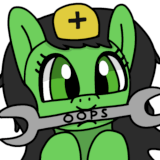
A small band of guardsponies find themselves surrounded in their city. Their enemy already savors her victory, but she will learn that even the darkest night must yield to the Sun.

🇭🇺 | "I will never trust a single word this femboy says ever again." - /mlp/ | Like what I do? Ko-Fi,
Page generated in 0.134 seconds
Total duration
1,069 users online
1,896,513 hits today, 2,561,572 yesterday
My Little Pony: Friendship is Magic Fanfiction
Designed and coded by knighty & Xaquseg - © 2011-2024
![]() Support us
Support us
SubStar
Chat!
Discord
Follow us
Twitter
MLP: Friendship is Magic® - © 2024 Hasbro Inc.®
Fimfiction is in no way affiliated with or endorsed by Hasbro Inc.®

I am speechless.... What an amazing read this was
*excited bat noises*
11144477
Thanks, I'm glad you liked it.
Very well done! I loved every bit of this.
This was great!
Very interesting, really enjoyed the atmosphere all throughout. The concept is really cool as well.
I'm just a bit confused as to why Chryssie didn't try to fight the statue, but I'm willing to suspend my disbelief.
Please, Chryssi, nobody buys this anymore and especially not the undead Celestia.
11145220
Well, I mostly just worked with the assumption that she's simply far too shocked to try considering it's the middle of the night and her brood was just decimated by a piece of fancy copper and the very ponies they killed the day before.
11145230
The risk was calculated, but man, she's bad at math.
11145247
That's kind of what I thought, so I guess that makes sense
11145247
Well, probably no one takes into account undead statues when planning an invasion. Though then, Canterlot Wedding wasn't the best-planned invasion either.
Good story reviewfily! It's a pretty straightforward telling of the ol' sleeping king story (in your case, Matjaž, right?) but there's absolutely nothing wrong with that. It's a tight, fun little story that doesn't waste too much time with unnecessary worldbuilding for what it wants to do, and that'a admirable. Good work!
11145274
Funnily enough, no that's not him. I based it on a legend about Ladislaus I. The exact poem was this, in case you're perhaps interested, but considering the language and the fact that it was written by our arguably greatest poet, who didn't compromise on filling his poems chock full of clever word-plays and artistic liberties, I'm a bit worried translators may not be able to grapple with it.
I'm very happy you liked it.
Suspenseful and satisfactory in how dark it is. Pony war stories are some of my favorite on the site, particularly those that nail the logistics of magical equine combat in some way. It's good to see more from you too.
11145282 That's incredibly interesting, the most lore I'd ever heard about mounted statues was that the position of the horse's legs allegedly spoke of the rider surviving battle or not.
Nice stuff, Hungarybroski.
11145285
Well, that's something I'm not sure I could deliver on yet, but I'm glad you liked the war part. I was a bit worried that the trope of "battered warband arriving to temporary safety" might be too tired of a trope, but it seems like my worries were, for the most part, unfounded.
It's a legend I learned of a few years ago and it has never really left my imagination because the way the poet paints the events is so visceral that I'm convinced that if it wasn't a 200 y.o. Hungarian poem, there would be metal songs about this legend.
This part especially is what inspired me for the main scene of this story (translation mine, sorry if anything sounds a bit weird, I'm not exactly a trained translator):
It has just a tiny bit of humor that contrasts the slaughter that follows so well.
11145310
Thanks, Britfren
The Unconquered Sun indeed! Thanks for both the thrilling story and pointing me to a really cool legend I hadn't heard of before. I don't think I could ever really tire of the dead fighting for the living trope, and this is such a fine variant thereof. Thanks for the epic fic!
11145379
Age certainly hasn't prevented metal bands from finding material, so perhaps there is still some hope. Unfortunately, I believe that if you mailed it in as a suggestion, then there would be a royalty dilemma.
You shouldn't sell yourself short, this looks fine to me. If you're really curious, the only substantial difference between your translation and what I'm finding online* are the following:
11146448
Thank you, that's a relief.
Arany (meaning "Gold," he really lived up to his name), the author of the poem, made all his poems both rhyme and have a meter. I had to compromise on this because I don't really have a strong enough grasp on English to keep either.
That's actually really funny. This verb might be one of my biggest enemies in the language. I never know which version is correct. Thinking about it, I'm leaning towards "lay." It makes most sense considering the original work.
Yeah, it's a completely different language family. No other language (except Finnish and a few tiny tribes in Russia) is anything similar to ours. You can imagine it made learning English quite the experience
I did remove one instance of the king's name being mentioned, but otherwise my excerpt is largely faithful to the original. I can't say for sure without seeing what you looked at, but I'm inclined to think those translations probably took some bigger liberties.
a lovely read
11146468
And I don't have a strong enough grasp of Hungarian to do the same.
Pro tip: most native speakers don't either.
Sounds like a painful one lmao.
Most likely the latter, though I could have been looking at a fragment from a different section.